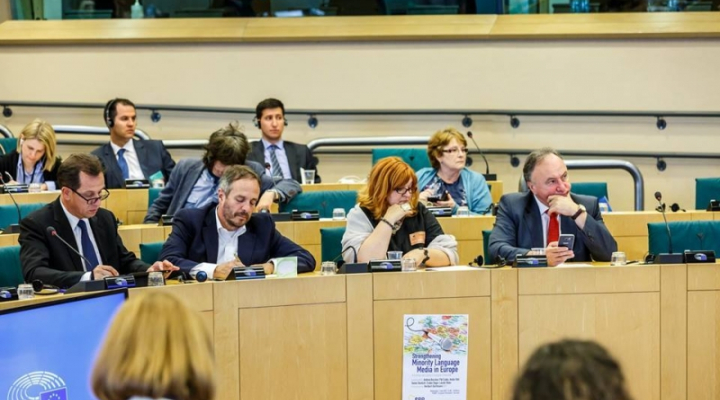Strengthening minority media should be a common European concern
With the participation of several experts from the Carpathian Basin a conference was held on the situation of Hungarian minority media on Wednesday, 7 June, in the European Parliament. The conference dealt with minority media in Romania, Slovakia, Serbia and Ukraine.
Attila Szász, deputy editor-in-chief of Radio Marosvásárhely and Ágnes Maksay, head of the Video Pontes TV studio in Cluj, spoke about the Romanian experiences. Bence Balázs, member of the European Association of Daily Newspapers Published in Minority and Regional Languages (MIDAS), informed the public not only about the Romanian but also about the pan-European situation in the area.
According to Csaba Sógor, MEP, the majority media in Romania often depict the Transylvanian Hungarian reality as they wish it to be seen. As an example, he mentioned the Csíksomlyó Pilgrimage, which has not appeared in any national report for years, despite the fact that that this pilgrimage is the most important one in Central-Eastern-Europe. "The most important thing would be that both the majority and the minority public media inform the public objectively” he stressed.
He also emphasized that the functioning of Hungarian-speaking press organs - either financed by foundations or privately - is also important for the Hungarian community in Romania, since this is one of the main pillars of creating media pluralism.
As a third priority, he pointed out that more and more minority media should start communicating in the language of the majority, too. "There are already good examples of this in the Hungarian community in Romania and we must continue to encourage this, since the majority, in this case the Romanian community, can best understand in their mother tongue that respect for minority rights does not mean any harm to the majority, on the contrary, they can also benefit from it", he said.
This issue was further stressed by Ágnes Maksay, who also finds it important to subtitle the Hungarian-speaking programmess for the Romanian community, in case of both commercial and public broadcasting. She stressed that one of the biggest problems of the Hungarian-speaking public service programmes is that they run during the working-hours, when few people watch television. As a result, Hungarians in Romania watch primarily public service programmes in Hungarian.
Attila Szász spoke about the underfunding of the public service radio broadcasting. Nowadays the technical trends are changing rapidly, and in Romania the lack of sufficient financial resources for development and for wages is a serious problem. He also believes that consumer habits are changing rapidly: up-to-date online interfaces and integrated video content are needed for radios as well. The editor-in-chief also pointed out that a public service radio has a unique community-building mission, too. The Marosvásárhely Radio broadcasts from 6 am to midnight, but they want to extend the broadcast time to 24 hours.
All MEPs supporting the conference stressed that minority language media is of key importance to the survival of national minorities and that strengthening it should be a common European concern.











